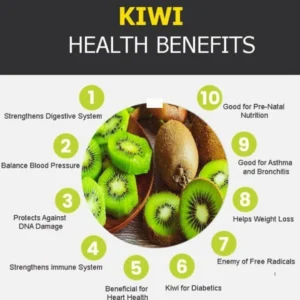Table of Contents
10+ Amazing Health Benefits of Kiwi and How to Maximize Them
If you haven’t tried kiwifruit yet, you might find yourself reaching for one after discovering its remarkable health advantages. Kiwi, often underestimated, packs an impressive array of vitamins, antioxidants, and essential nutrients that benefit various aspects of health. In this guide, we’ll explore why kiwi is considered a superfood and provide practical tips to make the most of its nutritional power.

10+ Amazing Health Benefits of Kiwi and How to Maximize Them
1. Nutritional Profile of Kiwi: A Powerhouse of Vitamins and Minerals
Kiwifruit, sometimes referred to as the “Chinese gooseberry,” is available in varieties such as green and golden kiwi. Despite its small size, kiwi contains high levels of essential vitamins, including:
- Vitamin C – more than oranges, providing immunity and antioxidant benefits
- Vitamin K – important for bone and cardiovascular health
- Fiber – aids digestion and helps in weight management
Here’s a detailed nutritional breakdown for a medium kiwi:
| Nutrient | Amount |
|---|---|
| Calories | 42 |
| Vitamin C | 71% DV |
| Fiber | 2.1 g |
| Vitamin K | 23% DV |
Is Eating Kiwi Skin Safe?
Many wonder if it’s safe to eat the skin of a kiwi. The answer is yes! The skin contains additional fiber and antioxidants, although it might have a fuzzy texture that some find unappealing. Wash the skin thoroughly before eating to remove any residues.
2. Health Benefits of Kiwi: Why You Should Include It in Your Diet
A. High in Antioxidants: Vitamins C and E
Kiwi’s high vitamin C content is a standout, surpassing that of oranges, which is beneficial for immune support, skin health, and reducing oxidative stress. Studies indicate that consuming kiwi can reduce cellular oxidative damage, which plays a role in reducing cancer risks, particularly colorectal cancer (source).
B. Supports Skin Health and Fights Aging
With a high level of vitamin C and polyphenols, kiwi is beneficial for maintaining skin elasticity and reducing signs of aging. Vitamin C is essential for collagen synthesis, which helps the skin remain youthful and resilient.
C. Promotes Respiratory Health
Research has shown that kiwi consumption may relieve symptoms in asthma sufferers, reducing wheezing, nasal congestion, and sore throats. Adding kiwi to your diet can thus support respiratory health, especially during cold seasons.
3. Kiwi vs. Orange: A Comparison of Nutritional Benefits
Both kiwi and oranges are rich in vitamin C and fiber, but kiwi offers unique advantages:
- Higher levels of lutein, beneficial for eye health and UV protection.
- A more balanced sugar level, making it a safer option for blood sugar management.
- Contains serotonin, which may help improve sleep quality.
While oranges are known for their antimicrobial properties and citrus scent, kiwi’s additional fiber and potassium make it slightly more versatile in terms of health benefits.
4. Other Noteworthy Health Benefits of Kiwi
A. Digestive Health
Thanks to its fiber content, kiwi aids digestion and can help relieve symptoms of IBS and constipation. Some studies suggest kiwi may act as a natural laxative, promoting more regular bowel movements without the harsh effects of chemical laxatives.
B. Cardiovascular Health
The potassium and vitamin K in kiwi support cardiovascular health by helping to regulate blood pressure and reducing the risk of arterial calcification. Including kiwi in your daily diet may lower the risk of stroke and heart attack.
C. Bone Health
Kiwi’s vitamin K content is vital for bone health as it aids in calcium absorption. Regular kiwi intake can help prevent osteoporosis and other bone-related issues, especially in aging populations.
D. Sleep Improvement
The serotonin content in kiwi can aid those struggling with insomnia, enhancing sleep duration and quality. Incorporate kiwi as a pre-bedtime snack to promote better sleep naturally.
E. Cancer-Fighting Properties
Traditional uses of kiwi in Chinese medicine include combating cancers of the liver, colon, and other organs. Studies show kiwi’s antioxidants and polysaccharides may inhibit the growth of cancer cells, making it a powerful food for cancer prevention (source).
5. Tips for Buying and Storing Kiwi
Kiwifruit is generally available from October through May but can be found year-round in many stores. For best results:
- Select firm kiwis if you plan to store them for a few days.
- To ripen kiwi faster, store it in a paper bag with an apple or banana.
- Ripe kiwis contain the most antioxidants and are ready to eat when slightly soft to the touch.
6. How to Enjoy Kiwi in Your Diet
Kiwi can be enjoyed in various ways:
- Blend it into smoothies for a vitamin-rich boost.
- Add it to salads for a sweet-tart flavor.
- Use it as a natural meat tenderizer by rubbing it on meat before cooking.
Whether eaten raw, in fruit salads, or baked goods, kiwi is a versatile fruit that fits well into a health-conscious diet. Remember, kiwi contains actinidain, an enzyme that may alter dairy-based dishes, so add it last when preparing fruit salads or desserts.
7. Potential Risks and Side Effects
Despite its benefits, kiwi may pose risks for individuals with certain allergies. Kiwi allergies, often associated with latex, can cause:
- Oral allergy syndrome
- Hives and swelling
- Anaphylaxis in severe cases
Additionally, people on beta-blockers should monitor their kiwi intake due to the high potassium content, which may affect kidney health in susceptible individuals.
Conclusion
Kiwifruit stands out as a small but mighty superfood with extensive health benefits ranging from antioxidant support to heart, bone, and skin health. Whether you’re looking to improve digestion, sleep better, or boost your immune system, adding kiwi to your diet can be a simple yet effective choice. Consider keeping a few kiwis in your daily diet to benefit from their diverse nutrients and support your long-term health journey.